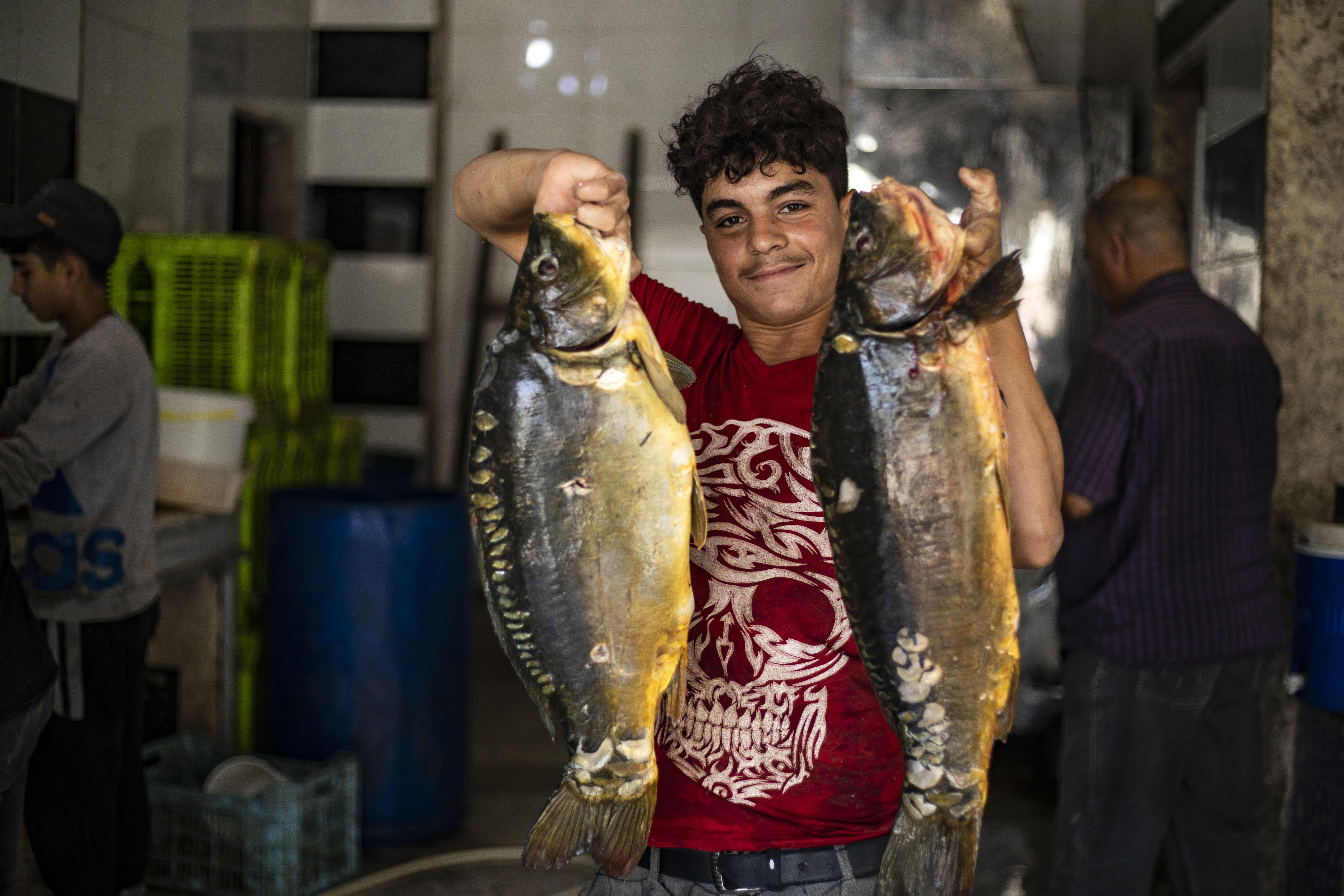Ismail Hilal, 50, who retired after 37 years as a fisherman, sits on a boat on the banks of Lake Assad near the village of Jaabar in Syria's Raqqa governorate on July 9, 2023. (Credit: Delil Souleiman/AFP)
Around war-torn Syria's biggest freshwater dam reservoir, fishermen say their catch is now a fraction of what it used to be as environmental pressures have decimated aquatic life.
Ismail Hilal, 50, sat on the hull of his rowboat — now lodged firmly on the shores of Lake Assad — as gentle waves washed in, talking about the way of life he has lost.
After 37 years as a fisherman, he has retired his nets, declaring defeat as fish stocks have declined, water levels have dropped and pollution has worsened in the Euphrates and the dam reservoir it feeds.
"I have spent my whole life on the water, since childhood," said Hilal, a father of seven. "But I was forced to stop this year. I couldn't live on fishing anymore."
Syria has endured more than a decade of civil war, and the nearby town of Raqqa was the center of the Islamic State group's brutal "caliphate" until its ouster in 2017.
 A young man carries a fish inside a shop, in Syria's northeastern city of Raqqa on July 9, 2023. (Credit: Delil Souleiman/AFP)
A young man carries a fish inside a shop, in Syria's northeastern city of Raqqa on July 9, 2023. (Credit: Delil Souleiman/AFP)
The battered country, where half a million died in the conflict, has also suffered the impacts of climate change, from searing summer heat to prolonged drought.
The flow of the Euphrates — one of the region's mighty streams, where the world's earliest civilizations flourished — has been further impacted by upstream dams in Turkey.
Other fishermen AFP spoke to also blamed the river's low water levels, lack of rainfall, worsening pollution and overfishing for the sharp decline in fish stocks.
Fishermen now "barely take in five percent" of their catch from former times, Hilal said.
He now works in a restaurant in Tabqa, on the eastern edge of the lake, toiling in front of a flaming hot oven and preparing and grilling fish instead of catching them.
'Downward spiral'
The Euphrates, said to have nourished the biblical Garden of Eden, runs for almost 2,800 kilometers (1,700 miles) through Turkey, Syria and Iraq, where it empties into the sea.
From the Turkish border, it flows southeast across Syria, irrigating its breadbasket region and filling the reservoirs of three hydroelectric dams that provide drinking water and electricity for millions.
Lake Assad is the biggest reservoir, stretching across 600 square kilometers (230 square miles).
But its water level has dropped by four meters (12 feet) since last year, says Dutch peace-building group PAX, which blames a "downward spiral of drought and water shortages."
The lack of water and the pollution are "driving further biodiversity loss along the lakes and rivers" in Syria's north and east, said the group's Wim Zwijnenburg.
Raqqa governorate received only 208 mm per month of rainfall last year, according to the UN Food and Agriculture Organization.
An AFP team visiting Lake Assad saw vast plumes of algae — an indicator of pollution, according to experts, that sucks oxygen from the water and kills aquatic life.
'Disastrous' situation
When Ali Shebli, 37, a fisherman like his father, pulled in his long green nets, they were empty except for a few bits of the seagrass that now chokes some shallow areas.
"In the past, we could take in 50 kilograms of fish" per day, he said. "But now we barely get one or two kilos, and sometimes nothing ... because of the low water level and the pollution."
Shebli, who struggles to support his wife, three children and his ill father, said the falling fish stocks had made the family's situation "disastrous."
The crisis has impacted the wider local economy.
Fish are displayed on blocks of ice at a market in nearby Raqqa, a town under Kurdish control since the IS was ousted by the Kurdish-led Syrian Democratic Forces.
But fishmonger Ragheb Ismail, 45, scaling fresh fish on a bench, said what is on offer now is a far cry from the times when there were "tons of fish" for sale.
"Now even the biggest fishmonger has no more than 200 kilograms on offer because of the drought, the lack of water and the high temperatures," he said.
These days, he said with frustration, there are plenty of customers but "not enough fish."
Ismail Hilal, 50, sat on the hull of his rowboat — now lodged firmly on the shores of Lake Assad — as gentle waves washed in, talking about the way of life he has lost.
...